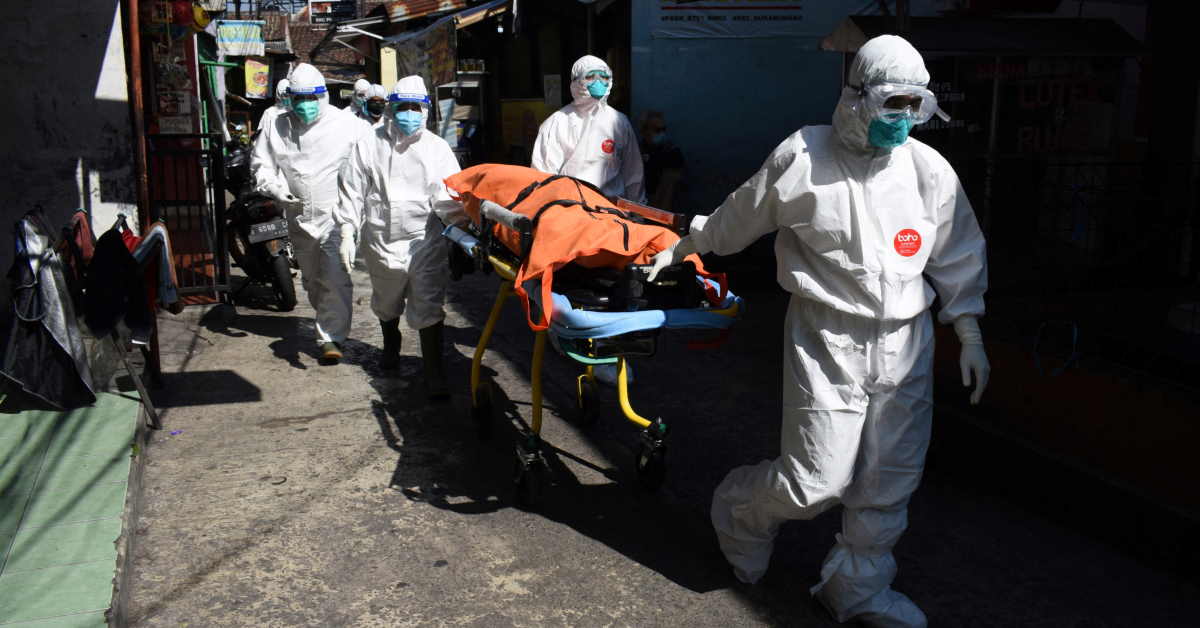More people are being forced to isolate at home as overwhelmed hospitals turn patients away. Many are dying. In a residential street in Bogor, on the outskirts of the Indonesian capital, yet another family has lost a loved one to COVID-19.
Sitting in front of her father’s body, a young woman sobs as she clutches her prayer beads. “Wake up, please don’t sleep,” she wails, as a team of undertakers carefully wraps his body in sanitised plastic.
The sound of grief is all too familiar to 32-year-old Muhammad Jauhar, who is part of the team assisting families in the area.
“We do various jobs in this task force, I drive the ambulance for the deceased and I prepare many things – including the coffin and the shroud,” he said.
“I also make preparations for cleaning, wrapping and delivering the body to the cemetery,” he said. Jauhar is not an undertaker – he actually works in television production as a director. But as Indonesia struggles through this recent surge in COVID-19 deaths, there are too many grieving families and not enough workers to bury the dead.
At COVID-19 burial sites, gravediggers work well into the night to keep up with their workload. Volunteers like Jauhar are now an essential part of Indonesia’s funeral industry.
“The impact of COVID is huge, the number of deaths in Bogor is really high. This is what we can do to help the families,” he said.
“We don’t receive any payment. We do the job from our heart.”
This month, Indonesia overtook India’s daily COVID-19 case numbers and surpassed Brazil in reporting the world’s highest number of daily deaths attributed to COVID-19.
Indonesia’s confirmed COVID-19 death toll stands at more than 73,000.
On Monday, Indonesia reported 1,338 COVID-19 deaths – its highest ever.
But experts warned even these figures are probably an undercount because the country’s testing for the coronavirus is so low. As overwhelmed hospitals are forced to turn away the sick, more people are dying at home in isolation. Many have never even had the chance to be treated by a medical professional.
‘Collapse’
Lapor COVID-19 is an independent group that collects and collates pandemic related data.
Ahmad Arif, one of the co-founders of the group, said their research indicated that the actual death toll is three to five times the government’s figures. “Most of those who died in isolation had trouble accessing the hospitals. Their condition deteriorated, they tried to go to hospital but they are full, so they died at home,” he said.
“We see that the deaths of people in self-isolation is an indicator of the collapse of our health services.”
Far from the situation getting better – there were signs that a health crisis is forming even in Indonesia’s more remote provinces.
“Deaths in self-isolation have started to happen outside Java. In the last week, we got data of people dying in Riau, Lampung, East Nusa Tenggara, Kalimantan, and more,” Ahmad said.
“This is an indication that cases cannot be contained by health services anymore.”
In Bogor, only three of the 50 volunteers in the burial task force are women. According to religious teachings, only an individual of the same sex should perform the Islamic rite of washing the deceased and shrouding the body.
37-year-old Nurhasanah was one of the female volunteers – as the other two women are students, she agreed to do the late shift.
She was supposed to start at 8:00 pm and finish at 5:00 am.
But as deaths in her community have surged, her shifts have become longer and sometimes she works for more than 14 hours a day.
“I’m a housewife, I have only ever worked at home before,” Nurhasanah said.
“I don’t really think about the timing. After I have seen the condition of these families, I feel in my heart, I want to help them.” During the past week, Nurhasanah has assisted in preparing the bodies of three to four women each day for burial.
She said she was not always able to bathe the body due to health protocols – so, in some situations, she cleaned the body with disinfectant and said a prayer.
“We do this from the heart, we just want to help them. I think about them even after I get home.” – Al Jazeera
